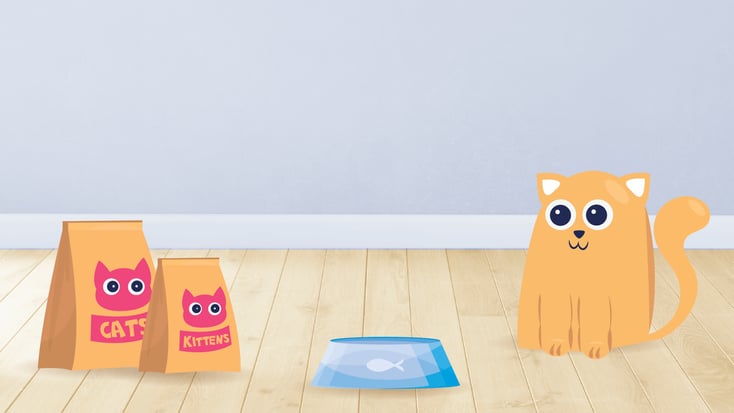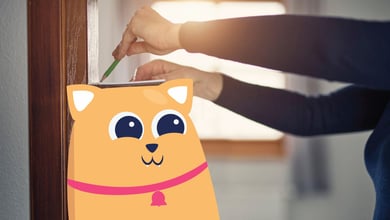Can Kittens Eat Adult Cat Food? A Vet Answers

Table of Contents
Knowing when to transition your kitten to adult cat food is one important step to help support your pet's growth and development.
In the first year of a kitten's life, they undergo many changes as they rapidly grow and develop. Considering how energetic and playful kittens are, it's easy to see why they have such high caloric needs.
Like humans, cats have different nutritional needs throughout each stage of their development. Whether you're a new kitten parent or have had cats for quite some time, every pet parent wants to ensure they're feeding their furry friend an appropriate diet.
Key Takeaways:
- Kittens should not eat adult cat food due to different nutritional needs.
- Kitten food has higher calories, protein, fat, and vital nutrients for growth.
- Transition to adult cat food gradually around one year of age, following your vet's guidance.
Can Kittens Eat Adult Cat Food?
Kittens should not be fed adult cat food as a regular part of their diet. Kittens have different nutritional needs compared to adult cats, and kitten-specific food is formulated to meet those needs.
If you're unsure which kitten food is the best for your furry friend, your BetterVet veterinarian can assist you with kitten nutrition planning.
During kitten wellness exams, your veterinarian will work with you to ensure your kitten's nutritional needs are satisfied.
What's the Difference Between Kitten vs. Adult Cat Food?
Kitten food formulas are specifically designed to meet the nutritional needs of high-energy kittens. As such, kitten food often has more calories, protein, and fat per serving when compared to adult cat food.
In addition, kitten food has higher levels of docosahexaenoic acid (DHA), an omega-3 fatty acid that helps your kitten's brain and eyesight develop properly.
Another difference between kitten and adult cat food is the number of vitamins and minerals in each serving. Kitten food may have different levels of calcium, Vitamin A, phosphorus, and other important nutrients that are vital to development.
Related reading: How to Read a Cat Food Label
How Big Will My Kitten Get?
How Big Will My Kitten Get?
View Results
What Happens if a Kitten Eats Adult Cat Food?
Adult cat food is not dangerous for kittens to consume. However, it does not contain the appropriate amount of nutrition for a growing kitten.
If your kitten accidentally eats adult cat food from another cat's bowl, there is no need to worry. Eating adult cat food once or twice won't cause any harm to your kitten.
When Can a Kitten Eat Adult Food?
While every cat will develop at their own rate, and some breeds may take longer to reach adulthood, most kittens can switch to adult cat food once they've reached about 90% of their adult weight.
Some larger breeds of cats, such as Maine Coons, may need to eat kitten food for a longer duration/until an older age.
How to Switch from Kitten Food to Adult Cat Food
Transitioning a kitten to adult cat food is a process that should be done gradually and typically begins when the kitten is about one year old.
Here's a step-by-step guide on how to switch your kitten to adult cat food:
1. Start the Transition
When your kitten is about one year old, you can start introducing adult cat food into their diet. Begin by replacing about 25% of their kitten food with adult food. This mix should be given to your kitten for several days.
2. Increase the Proportion
After several days, increase the amount of adult food to 50% of their overall diet. Again, maintain this ratio for a few days to allow your kitten's digestive system to adjust.
3. Adjust the Percentage of Food
Next, shift the balance to 75% adult food and 25% kitten food. As before, maintain this new ratio for several days.
4. Complete the Transition
Finally, you can move to 100% adult food.
Throughout this process, monitor your cat for any signs of digestive upset, such as vomiting, diarrhea, or loss of appetite. If any of these occur, slow down the transition process and consult your vet.
Remember, each cat is unique and may require adjustments to this process. Always consult with your vet before starting the transition to ensure it's the right time and approach for your pet.
BetterVet Can Help Support Your Kitten's Nutritional Needs
Choosing the best kitten food for your furry friend is not always easy! Have questions about when to transition your kitten to eating adult food? We can help! Book an appointment with BetterVet for expert guidance about your companion's nutritional needs.
Frequently Asked Questions
How long can kittens keep eating kitten food?
In general, most kittens should eat specially designed kitten food for the first ten months to a year of their life.
Can you switch kitten food brands?
Yes, there are a variety of reasons why kitten owners may choose to switch kitten food brands. For example, if your kitten is not eating a specific type or you have concerns about the quality of the food, it may be helpful to discuss brands with your BetterVet veterinarian.
Is adult cat food bad for kittens?
Adult cat food does not contain the proper nutrients for a growing kitten to thrive. For this reason, kittens should only eat kitten food that can satisfy their nutritional needs. However, adult cat food is not dangerous for kittens to consume.
Can adult cats eat kitten food?
Kitten food is not dangerous for adult cats to consume. However, when comparing kitten food to adult cat food, you'll find that the two formulas have many differences. Adult cats do not have the high caloric needs of kittens. Adult cats eating kitten food can end up consuming too many calories, which could result in excess weight gain.






